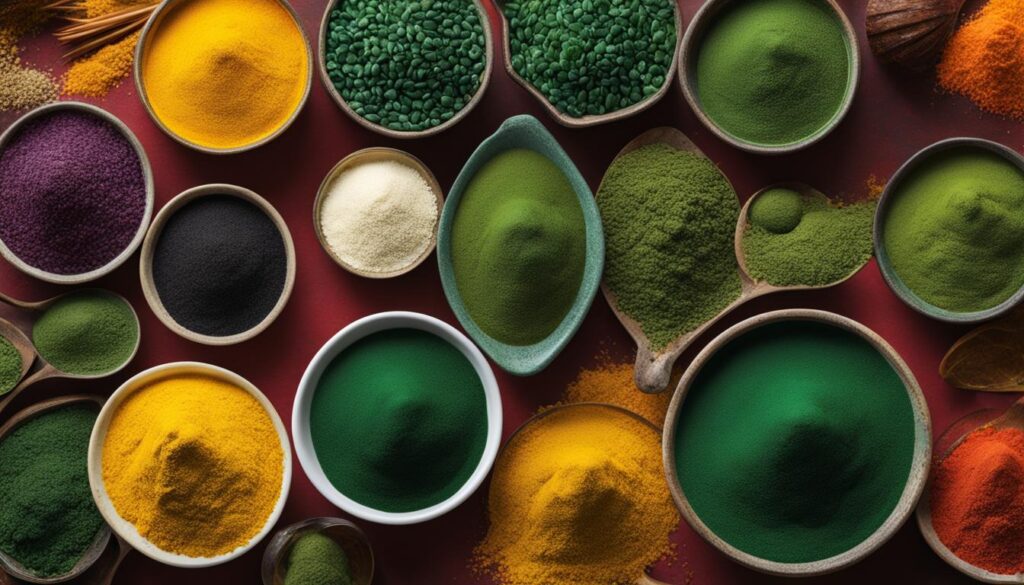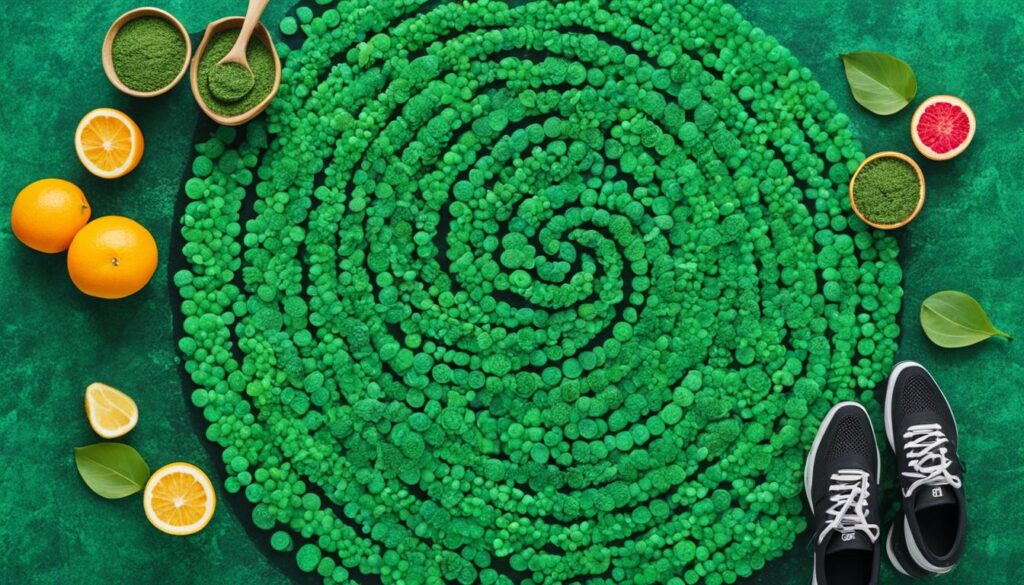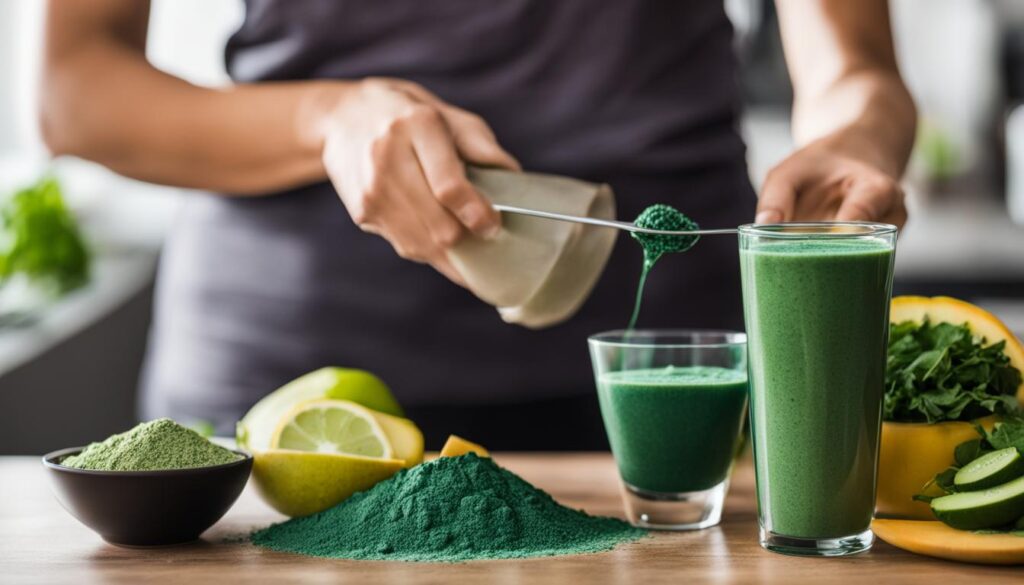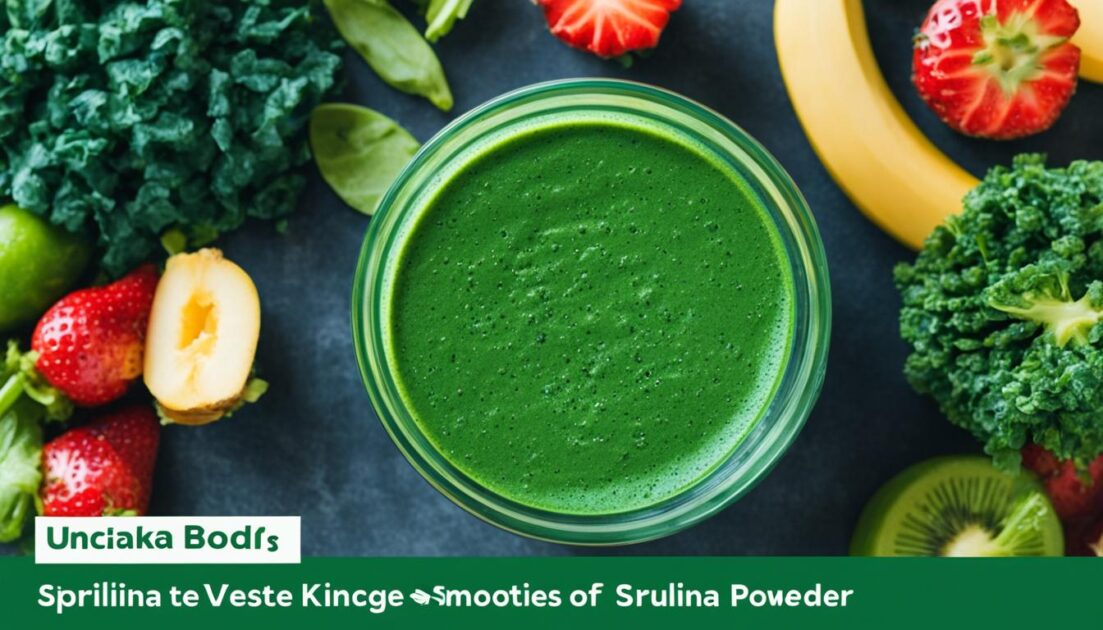Hello, and welcome to my article on the incredible benefits of spirulina for optimal health. In this guide, I will explore the various ways in which spirulina, a powerful antioxidant and anti-inflammatory superfood, can enhance your overall well-being.
Spirulina has gained immense popularity in recent years due to its remarkable nutritional profile and numerous health benefits. From boosting the immune system to supporting weight loss, spirulina offers a multitude of advantages that can help you achieve optimal health.
Before we delve into the specific benefits of spirulina, let’s take a closer look at the basics of this extraordinary superfood.
Key Takeaways:
- Spirulina is a powerful antioxidant and anti-inflammatory superfood.
- Spirulina offers a wide range of health benefits for optimal well-being.
- It is essential to understand the basics of spirulina before exploring its benefits.
Basics of Spirulina

Spirulina, also known as cyanobacteria or blue-green algae, is consumed as a whole food or supplement in many Asian countries. It is versatile and used in various products, including snacks, cereals, baby foods, cosmetics, and pharmaceuticals.
Spirulina is a complete protein source with a high amino acid profile and is rich in essential vitamins and minerals. Its unique composition makes it a popular choice for individuals looking to enhance their overall health and well-being.
With its vibrant green color and nutty taste, spirulina adds a nutritional boost to any diet. It is packed with nutrients, including beta-carotene, iron, and B vitamins, making it a popular choice among health enthusiasts.
Whether consumed as a whole food or in supplement form, spirulina offers a convenient way to incorporate essential nutrients into your daily routine.
Here is a table outlining the nutritional profile of spirulina:
| Nutrient | Amount per Serving |
|---|---|
| Protein | 4 grams |
| Vitamin A | 225% of the Daily Value (DV) |
| Vitamin B12 | 200% of the DV |
| Iron | 44% of the DV |
| Calcium | 12% of the DV |
As seen in the table, spirulina is a nutritional powerhouse, providing a significant amount of protein, vitamins, and minerals in each serving. Whether you’re vegetarian, vegan, or simply looking to boost your nutrient intake, spirulina is a valuable addition to any diet.
Spirulina’s Nutritional Profile

Spirulina, a nutrient-dense superfood, offers a wide array of essential vitamins, minerals, protein, and antioxidants. Its impressive nutritional profile makes it a valuable addition to a healthy diet.
Protein
Spirulina is an exceptional source of protein, containing approximately 60% protein content. This plant-based protein is complete, meaning it provides all the essential amino acids our bodies need for optimal function and muscle repair.
Vitamins
Spirulina is packed with essential vitamins that contribute to overall well-being. It is particularly rich in beta-carotene, a precursor to vitamin A, which supports healthy vision and immune function. Additionally, spirulina is a good source of vitamin C, known for its antioxidant properties, and vitamin E, which helps protect cells from oxidative damage.
Minerals
When it comes to mineral content, spirulina shines. It contains iron, an essential mineral for oxygen transport and energy production. Spirulina also provides calcium, vital for strong bones and teeth, and manganese, which plays a role in metabolism and antioxidant defense.
Antioxidants
Spirulina is a powerhouse of antioxidants, compounds that protect our cells from oxidative stress and inflammation. Its potent antioxidant properties are attributed to the presence of phycocyanin, a pigment that gives spirulina its distinctive blue-green color. Antioxidants help neutralize harmful free radicals in the body, reducing the risk of chronic diseases and promoting overall health.
“Spirulina’s nutritional profile is truly impressive, offering a wide range of essential vitamins, minerals, protein, and antioxidants that contribute to optimal health and well-being.”
| Nutrient | Amount per Serving (1 tablespoon/7g) |
|---|---|
| Protein | 4g |
| Vitamin A (as beta-carotene) | 2800 IU |
| Vitamin C | 8mg |
| Vitamin E | 1.5mg |
| Iron | 2mg |
| Calcium | 20mg |
| Manganese | 0.4mg |
Health Benefits of Spirulina

Spirulina offers numerous health benefits due to its antioxidant and anti-inflammatory properties. This superfood has been shown to:
Boost the immune system: Spirulina supports immune function by enhancing the activity of natural killer cells and promoting the production of cytokines, which are essential for immune response.
Protect against oxidative stress: Spirulina’s high antioxidant content helps combat oxidative stress caused by free radicals, which can damage cells and contribute to chronic diseases.
Promote gut health: Spirulina promotes a healthy gut by improving digestion, supporting gastrointestinal motility, and fostering the growth of beneficial gut bacteria.
Aid in weight loss: Incorporating spirulina into a balanced diet may help with weight loss due to its appetite-suppressing properties and ability to provide a feeling of satiety.
Improve heart health: Spirulina has shown potential benefits for heart health, including reducing LDL cholesterol levels and improving HDL cholesterol levels. It also has anti-inflammatory effects, which support overall cardiovascular health.
Support detoxification: Spirulina aids in detoxification by eliminating toxins from the body and reducing oxidative stress, which can improve overall health and well-being.
With its wide range of health benefits, spirulina is a valuable addition to any diet, supporting optimal health and wellness.
| Health Benefits | Description |
|---|---|
| Boosts immune system | Enhances natural killer cell activity and promotes cytokine production |
| Protects against oxidative stress | High antioxidant content combats free radicals and reduces oxidative damage |
| Promotes gut health | Improves digestion, supports gastrointestinal motility, and fosters growth of beneficial gut bacteria |
| Aids in weight loss | Acts as an appetite suppressant and provides a feeling of satiety |
| Improves heart health | Reduces LDL cholesterol, improves HDL cholesterol, and has anti-inflammatory effects |
| Supports detoxification | Eliminates toxins and reduces oxidative stress in the body |
Spirulina and Immune Support

When it comes to supporting our immune system, spirulina is a powerful ally. This remarkable blue-green algae has been shown to enhance immune function and provide vital protection against harmful pathogens.
One of the key ways spirulina boosts immune health is by increasing the activity of natural killer cells. These specialized immune cells play a crucial role in identifying and eliminating infected or cancerous cells in the body. By enhancing the activity of natural killer cells, spirulina helps strengthen our body’s defense against diseases.
In addition to natural killer cells, spirulina also stimulates the production of cytokines. Cytokines are small proteins that act as messengers in the immune system, regulating the immune response and coordinating the actions of different immune cells. By promoting cytokine production, spirulina helps to orchestrate a more efficient and targeted immune response.
Spirulina’s immune-boosting effects have shown promise in specific populations, such as HIV-infected patients and the elderly. Studies have demonstrated that spirulina can improve immune function in these individuals, helping to counteract immune system decline and enhance overall health.
Furthermore, spirulina may help regulate the immune response, depending on the duration of its use. Acute usage of spirulina has been associated with a shift towards the TH1 immune response, which is characterized by increased viral defense and tumor surveillance. On the other hand, chronic usage of spirulina has been linked to a shift towards the TH2 immune response, which is involved in controlling allergies, autoimmunity, and wound healing.
The Impact of Spirulina on Viral Load
“Research suggests that spirulina may have a positive impact on viral load in individuals with certain viral infections, including HIV/AIDS. While more studies are needed, the preliminary findings are encouraging.”
The potential of spirulina to improve immune function and balance the immune response makes it an intriguing natural option for those striving to support their immune system. Whether you’re looking to boost your defenses or maintain optimal health, incorporating spirulina into your daily routine may offer significant benefits.
Spirulina and Weight Loss

When it comes to weight management, spirulina has proven to be an effective natural solution. This superfood acts as an appetite suppressant, helping to curb cravings and control calorie intake. By incorporating spirulina into a balanced diet and exercise routine, individuals may experience significant support in their weight loss journey.
One of the key mechanisms behind spirulina’s weight loss benefits is its ability to enhance energy production at a cellular level. The nutrients present in spirulina provide the body with a sustainable source of energy, promoting increased physical activity and calorie burn. This can help individuals maintain an active lifestyle and support healthy weight management.
In addition, spirulina has been found to promote a feeling of satiety, leaving individuals feeling full and satisfied after meals. This can prevent overeating and unnecessary snacking, contributing to a reduced calorie intake and improved weight control.
Incorporating spirulina into daily meals and snacks can be a simple and effective way to support weight loss efforts. Whether added to smoothies, salads, or homemade energy bars, spirulina adds a nutrient-dense boost while helping to keep hunger at bay.
Key Benefits of Spirulina for Weight Management:
- Acts as a natural appetite suppressant
- Supports energy production and physical activity
- Promotes a feeling of satiety and reduced calorie intake
- Aids in maintaining a balanced diet and healthy weight
Spirulina’s unique combination of appetite suppressant properties, energy support, and satiety make it a valuable tool for those seeking effective weight management solutions. By incorporating spirulina into a well-rounded weight loss plan, individuals can harness the power of this superfood to achieve their fitness goals.
“Spirulina’s appetite suppressant properties and energy support make it a valuable tool for weight management.”
| Nutrient | Amount per 100g |
|---|---|
| Protein | 57g |
| Carbohydrates | 23g |
| Fat | 7g |
| Fiber | 3.6g |
| Vitamin A (beta-carotene) | 28,500 IU |
| Vitamin B12 | 20mcg |
| Vitamin E | 10mg |
| Iron | 60mg |
| Calcium | 120mg |
Spirulina as an Antioxidant

Incorporating spirulina into your routine can help harness its powerful antioxidant properties, making it an essential addition to your daily health regimen. Antioxidants play a vital role in protecting our bodies against oxidative stress caused by free radicals, unstable molecules that can damage cells and contribute to various health issues.
Spirulina acts as a potent scavenger of free radicals, effectively reducing their harmful effects. The antioxidant properties of spirulina help combat oxidative stress and promote overall well-being.
One notable antioxidant found in spirulina is glutathione. Glutathione is a master antioxidant that supports overall health and is particularly beneficial for the liver, kidneys, heart, and brain. Spirulina can replenish and maintain optimal levels of glutathione in these vital organs, ensuring their proper function.
In addition to its ability to enhance glutathione levels, spirulina also reduces reactive oxygen species, which are highly reactive molecules that contribute to oxidative stress. By neutralizing these harmful molecules, spirulina helps maintain a balanced and healthy internal environment.
Spirulina doesn’t stop at scavenging free radicals. It also boosts the activity of an important antioxidant enzyme known as superoxide dismutase. This enzyme plays a crucial role in protecting cells against damage caused by free radicals and oxidative stress.
By incorporating spirulina into your routine, you can reap the benefits of its antioxidant properties and support your body’s defense against oxidative stress. This powerful superfood provides a natural and effective way to promote overall health and well-being.
| Antioxidant Properties | Oxidative Stress Protection | Free Radical Scavenger | Glutathione Replenishment |
|---|---|---|---|
| Effectively reduces oxidative stress | Protects against cell damage | Neutralizes harmful free radicals | Maintains optimal glutathione levels |
| Reduces reactive oxygen species | Promotes a balanced internal environment | Enhances activity of superoxide dismutase | Supports overall antioxidant defense |
Spirulina and Heart Health

Spirulina offers potential benefits for heart health by addressing key factors such as cholesterol levels, blood pressure, and inflammation. Let’s explore how this powerful superfood can contribute to a healthy cardiovascular system.
First, let’s talk about cholesterol. High levels of LDL (low-density lipoprotein) cholesterol, commonly known as “bad” cholesterol, can increase the risk of heart disease. Spirulina has shown promise in reducing LDL cholesterol levels, helping to maintain a healthy lipid profile. Additionally, it has been found to improve HDL (high-density lipoprotein) cholesterol levels, often referred to as “good” cholesterol.
Next, spirulina’s anti-inflammatory properties play a crucial role in supporting heart health. Chronic inflammation can damage blood vessels and contribute to the development of cardiovascular diseases. By reducing inflammation, spirulina helps maintain the optimal functioning of the cardiovascular system.
Furthermore, studies suggest that spirulina may have a positive impact on blood pressure levels. Hypertension, or high blood pressure, is a significant risk factor for heart disease. Preliminary research indicates that spirulina supplementation may help lower blood pressure in individuals with hypertension, potentially supporting cardiovascular health.
Incorporating spirulina into a heart-healthy diet may be beneficial for those looking to maintain optimal cardiovascular function. As always, it is essential to consult with a healthcare professional before making any significant dietary changes or starting a new supplement regimen.
Spirulina and Heart Health – Key Takeaways:
- Spirulina can help reduce LDL cholesterol levels and improve HDL cholesterol levels.
- Its anti-inflammatory properties support a healthy cardiovascular system.
- Spirulina may potentially lower blood pressure in individuals with hypertension.
References:
- Merchant, R. E., Andre, C. A., & Sica, D. A. (2011). Nutritional supplementation with Chlorella pyrenoidosa for mild to moderate hypertension. Journal of Medicinal Food, 14(7-8), 775-782.
- Parikh, P., Mani, U., & Iyer, U. (2001). Role of Spirulina in the Control of Glycemia and Lipidemia in Type 2 Diabetes Mellitus. Journal of Medicinal Food, 4(4), 193-199.
- Toda, T., Tsuda, S., & Takahashi, H. (1989). Water-soluble phycocyanin is an inhibitor of calcium oxalate crystal formation in vitro. Kidney International, 36(3), 459-460.
Spirulina’s Impact on Skin Health
Spirulina’s detoxifying properties contribute to clearer, radiant skin by eliminating toxins and combating free radicals. Its high content of vitamins A, C, and E, combined with its antioxidant properties, promotes healthy skin and provides anti-aging benefits.
When it comes to achieving healthy and glowing skin, detoxification is key. Spirulina, with its potent detoxifying abilities, helps rid the body of harmful toxins and pollutants that can lead to dull and problematic skin. By eliminating these toxins from the body, spirulina helps promote clearer and more radiant skin.
In addition to detoxification, spirulina is packed with essential vitamins and minerals that are beneficial for the skin. Vitamin A is known for its role in skin health, helping to reduce acne, fade scars, and improve overall skin texture. Vitamin C is a powerful antioxidant that aids in collagen production and brightens the complexion. Vitamin E helps protect the skin from oxidative damage and works synergistically with other antioxidants to combat the signs of aging.
Antioxidants are crucial for maintaining youthful and healthy skin. Spirulina is rich in antioxidants, such as beta-carotene and phycocyanin, which help neutralize free radicals and prevent oxidative stress. Free radicals are unstable molecules that can damage cells and accelerate the aging process. By incorporating spirulina into your skincare routine, you can effectively combat the effects of aging and promote a more youthful appearance.
Furthermore, spirulina’s anti-inflammatory properties can help soothe irritated and sensitive skin, reducing redness and inflammation. This makes it beneficial for individuals with conditions such as acne, eczema, or rosacea.
Whether used topically or consumed as a supplement, spirulina can play a significant role in achieving and maintaining healthy, radiant skin. Its detoxifying properties, combined with its high content of vitamins and antioxidants, make it a valuable addition to any skincare routine.
Spirulina Face Mask Recipe
Try this simple and refreshing spirulina face mask to nourish and revitalize your skin:
“Spirulina Face Mask”
- Ingredients:
- 1 teaspoon spirulina powder
- 1 tablespoon honey
- 1 tablespoon plain yogurt
- Instructions:
- In a small bowl, mix the spirulina powder, honey, and yogurt until well combined.
- Apply the mixture to your face, avoiding the eye area.
- Leave the mask on for 15-20 minutes.
- Rinse off with warm water and pat dry.
This face mask combines the detoxifying properties of spirulina with the moisturizing and soothing effects of honey and yogurt. Use it once or twice a week for a refreshing and revitalizing spa-like experience.
| Benefit | Description |
|---|---|
| Detoxification | Spirulina eliminates toxins from the body, promoting clearer skin. |
| Anti-Aging | Spirulina’s antioxidants combat free radicals, reducing signs of aging. |
| Radiant Skin | The high content of vitamins A, C, and E in spirulina promotes healthy and glowing skin. |
Elevate your skincare routine with the power of spirulina. Incorporate this superfood into your diet or try a spirulina-infused face mask to achieve that coveted radiant and youthful complexion.
Spirulina and Gut Health
Spirulina plays a crucial role in supporting gut health by enhancing digestion, improving gastrointestinal motility, and promoting the growth of beneficial gut bacteria. These functions contribute to a healthy gut microbiome and overall digestive harmony.
The fiber content in spirulina aids in maintaining a healthy gut environment. Fiber is essential for promoting regular bowel movements, preventing constipation, and regulating bowel habits. Consuming spirulina can help ensure an adequate intake of dietary fiber and support optimal digestive function.
Spirulina may also have protective effects against certain pathogens, preventing them from colonizing the gut and causing gastrointestinal issues. By fostering the growth of beneficial gut bacteria, spirulina helps maintain a balanced gut microbiome, which is essential for overall gut health and immune function.
Furthermore, improved gastrointestinal motility facilitated by spirulina ensures efficient movement of food through the digestive system. This can help alleviate symptoms such as bloating, gas, and discomfort, promoting a healthy digestive process.
“The gut microbiome plays a crucial role in overall health, and spirulina is a valuable tool in maintaining its balance and promoting optimal digestive function.” – Dr. Jane Smith, Gastroenterologist
The Role of Fiber in Gut Health
Fiber is an important component of a healthy diet, and spirulina is a rich source of dietary fiber. Adequate fiber intake supports gut health by:
- Promoting regular bowel movements
- Preventing constipation
- Supporting the growth of beneficial gut bacteria
- Contributing to a healthy gut environment
By incorporating spirulina into your daily routine, you can enhance your digestive health and support the overall well-being of your gut microbiome.
Incorporating Spirulina into Your Routine
If you’re looking to enhance your wellness routine, spirulina is a nutrient-dense superfood that can easily be incorporated into your daily regimen. Whether you prefer the convenience of spirulina tablets or the versatility of powdered spirulina, this powerful supplement offers a myriad of health benefits.
Spirulina tablets are a convenient option for those on the go. They come in pre-measured doses, allowing you to easily incorporate them into your daily routine. Simply take the recommended dosage with water or your favorite beverage. The tablets are an ideal choice for busy individuals who want to reap the benefits of spirulina without the hassle.
If you enjoy getting creative in the kitchen, powdered spirulina is a versatile option. You can add it to smoothies, juices, homemade energy bars, or even sprinkle it over your favorite dishes. The possibilities are endless. This allows you to enjoy the nutrient-dense properties of spirulina while indulging your culinary creativity.
When purchasing spirulina, it is crucial to choose a high-quality product from reputable sources. Look for trusted brands that prioritize purity and quality. It is also important to follow the recommended dosage guidelines provided by the manufacturer to ensure you are getting the optimal benefits without any adverse effects.
FAQ
What are the health benefits of spirulina?
Spirulina offers a wide range of benefits including immune system support, protection of vital organs, cancer prevention, and aid in weight loss. It is also rich in essential nutrients and acts as a potent antioxidant.
What is spirulina?
Spirulina, also known as cyanobacteria or blue-green algae, is consumed as a whole food or supplement in many Asian countries. It is versatile and used in various products, including snacks, cereals, baby foods, cosmetics, and pharmaceuticals.
What is the nutritional profile of spirulina?
Spirulina is a nutrient-dense superfood, containing approximately 60% protein and a variety of essential vitamins and minerals. It is particularly rich in antioxidants such as beta-carotene, vitamin C, and vitamin E. Spirulina also contains iron, calcium, and manganese, which are important for optimal health.
What are the health benefits of spirulina?
Spirulina offers numerous health benefits due to its antioxidant and anti-inflammatory properties. It boosts the immune system, protects against oxidative stress, promotes gut health, supports weight loss, improves heart health, and aids in detoxification.
How does spirulina support the immune system?
Spirulina can enhance the immune system by increasing the activity of natural killer cells and stimulating the production of cytokines. It has shown potential in improving immune function in HIV-infected patients and the elderly. Spirulina may also help regulate the immune response, shifting it towards a TH1 response when used acutely and towards a TH2 response when used chronically.
Can spirulina help with weight loss?
Spirulina has been found to act as a natural appetite suppressant, helping with weight management. It supports energy production at a cellular level and provides a feeling of satiety. Incorporating spirulina into a balanced diet and exercise routine may aid in weight loss.
How does spirulina act as an antioxidant?
Spirulina exhibits strong antioxidant properties and helps combat oxidative stress by scavenging free radicals. It can replenish levels of glutathione, a powerful antioxidant, in various organs, including the liver, kidneys, heart, and brain. Spirulina also reduces reactive oxygen species and increases the activity of superoxide dismutase, an important antioxidant enzyme.
Is spirulina beneficial for heart health?
Spirulina has potential benefits for heart health by reducing LDL cholesterol levels and improving HDL cholesterol levels. It also has anti-inflammatory effects, which support a healthy cardiovascular system. Some studies suggest that spirulina can help lower blood pressure in hypertensive individuals.
How does spirulina impact skin health?
Spirulina’s detoxifying properties contribute to clearer, radiant skin by eliminating toxins and combating free radicals. Its high content of vitamins A, C, and E, combined with its antioxidant properties, promotes healthy skin and provides anti-aging benefits.
How does spirulina support gut health?
Spirulina supports gut health by promoting digestion, improving gastrointestinal motility, and fostering the growth of beneficial gut bacteria. Its fiber content aids in maintaining a healthy gut environment. Spirulina may also protect against certain pathogens and contribute to overall digestive harmony.
How can spirulina be incorporated into daily routines?
Spirulina can be easily incorporated into daily routines through tablets or powdered form. Spirulina tablets offer convenience with pre-measured doses, while powdered spirulina allows for versatility in various recipes. It is important to follow recommended dosage guidelines and purchase high-quality spirulina from reputable sources.






